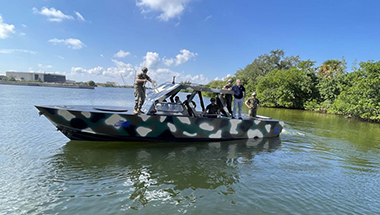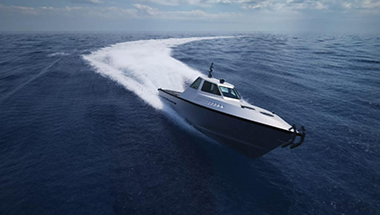Marine Forces Reserve Eyes a New Small Craft Mission
Aligned with its Campaign Plan 2030 strategic themes, “relevant, ready and responsive,” Marine Forces Reserve (MFR) is pursuing the rapid acquisition of small expeditionary watercraft to provide capacity and platforms in support of Service-level Force Design 2030 experimentation efforts.
By partnering with the Defense Innovation Unit (DIU) and leveraging their Commercial Solutions Opening (CSO) solicitation process, which is an iterative and competitive phased approach that includes vendor presentations and extensive review of materials, the collaborative effort narrowed the list of potential commercial craft down to four finalists. The chosen small boat(s) will offer the opportunity for Service-level experimentation and analysis in the realm of littoral operations, reconnaissance and counter reconnaissance, signature management and operations in support of expeditionary advanced base operations. These assets will afford MFR the ability to provide additional evaluation of a new, relevant capability at future training and exercises.
This forward-leaning acquisition strategy was inspired by the Force Design 2030 Annual Update 2021, which states, “Our ability to innovate is a hallmark of the Corps. It demands rigorous intellectual work, coordination among a plethora of organizations and individuals, and a certain ruthlessness to abandon familiar ideas, capabilities, and platforms which no longer provide relative advantage.”
MFR, DIU and the Marine Corps Warfighting Laboratory (MCWL) are leading that charge to swiftly acquire commercially available platforms needed to support live-force experimentation and inform USMC capability requirements development. The rapid acquisition of these small craft is intended to coincide with Service approval for MFR to retain and reorganize two companies from 4th Assault Amphibian Battalion (4th AA Bn) into Littoral Craft Companies, which will assume the small expeditionary watercraft mission.
As these companies come online, their efforts over the next few years will help inform and define the mission of small craft units and assess how small craft capability might scale within the Service. The newly procured assets will also provide an opportunity to retain quality Reserve Marines and provide them with new opportunities, responsibilities and purpose.
4th AA Bn leadership recently hosted four separate tactical watercraft vendors at the unit’s Reserve Training Center in Tampa, Florida. DIU acquisition and project managers facilitated the effort using the fast and flexible CSO process. Selected boat vendors presented their craft during static displays, answered queries during question-and-answer periods and conducted on-the-water demonstrations to showcase general craft characteristics and capabilities.
Brig. Gen. Douglas Clark, 4th Marine Division commanding general, was personally on site to oversee the demonstrations and evaluations and to host other distinguished visitors interested in small craft experimentation and capability development.
“This is a great opportunity for us here within Marine Forces Reserve to help generate data for Force Design’s campaign of learning,” Clark said. “We’re looking at small boats from the commercial industry to see what options we may want to pursue for experimentation and to gain experience for a better understanding of how to conduct operations in the littorals.”
Experts from across the Navy and Marine Corps were included throughout the process of vetting the commercial offerings, assessing the proposed products and analyzing the potential acquisition procedures. From seasoned boat technicians to special warfare personnel, the evaluation panel was comprised of specifically chosen subject-matter experts to assist in selecting the most viable option for experimenting and informing how small craft can contribute to littoral operations. The event was well attended by multiple senior military leaders.
DIU project manager Heather Ichord is helping the Marine Corps and MFR effectively use and navigate the CSO process.
“The DIU team was introduced to the Marine Forces Reserve small craft initiative through the Marine Innovation Unit and from there we started with 34 vendors in August,” Ichord said. “Our evaluation team down-selected to 12; we heard 11 presentations, and then we were able to see, and get on the water with these (four) vendors.”
The overall process from conceptual idea to research, pitches, decision(s) and forthcoming selection(s) of these small craft occurred in less than five months.
“While safety is paramount in our selections, the idea is to get better and faster with increased collaboration with the private sector,” Ichord said. “There are some great ideas and technology across the U.S. and our industrial base on how to get after some of the broader national security challenges coming our way.”
The next phase of the process includes contract awards to selected vendor(s) and spending the next 18 to 24 months conducting concept and limited engineering experimentation. The designated companies of 4th AA Bn, alongside the selected vendor(s), will tackle that portion of the mission, with oversight from DIU and experimentation direction from MCWL. These two Reserve units from Galveston, Texas, and Tampa, Florida, respectively, will be assigned to experiment with and evaluate the newly selected watercraft as well as the numerous sensor and mission-profile packages that may be configured on the platforms.
MFR plans to use Congressionally-approved National Guard and Reserve Equipment Appropriation funds, commonly known as NGREA, to purchase the initial expeditionary craft. Use of this funding will not impact MFR’s annual budget, nor will it hinder or delay any other areas of operations or innovation across the Total Force. MFR expects to extend contractual offers with anticipated acceptance by spring 2023. The initial delivery of small boats is expected to arrive in spring/early summer 2023.
Clark reinforced MFR’s contribution to Service-level needs and priorities: “What we’re doing here is generating opportunities for our Reserve Marines to get involved in Service-level innovation efforts and to help inform Force Design 2030 future capability requirements.”
In this challenging recruiting and retention environment, this MFR small craft initiative exemplifies creativity and innovation. It seeks to put a concept-relevant capability in the hands of talented Reserve Marines who can support and inform Service-level small-craft capability requirements development and other operations as directed.
“We definitely needed something new and I think it’s a step in the right direction for the Reserve and the Marine Corps,” said Delta Company’s Sgt. Jackson Stroud. “I think this will affect retention amazingly (by) giving these junior Marines the opportunity, and non-commissioned officers the opportunity, to step up and accept the new challenge.”
Who We Are: The United States Marine Corps Reserve is responsible for providing trained units and qualified individuals for mobilization to active duty in time of war, national emergency, and crisis or contingency operations. On a day-to-day basis, Marine Forces Reserve consists of a talented and dedicated pool of nearly 100,000 Marines able to augment the Active Component in a myriad of ways, to include operational deployments, support to training, participation in bi/multi-lateral exercises with partner nations and allies, and service-level experimentation in support of Force Design 2030 and refinement of new concepts, tactics, techniques, and procedures.



